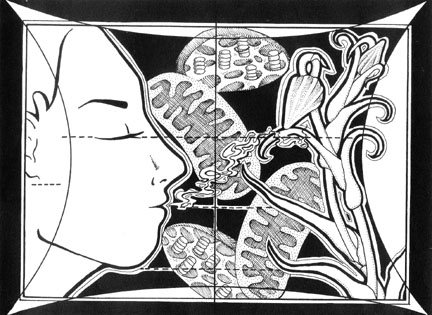Knowledge Gardening

Some of our work involves efforts to help young Aboriginal people reconnect with the traditional knowledge held by their Elders. Other of our work involves efforts to help all people, regardless of ethnicity, age, career, or community, to recognize the strengths in the Indigenous sciences and this side-by-side with the strengths in the Western sciences and all concurrently with respectful, meaningful acknowledgement of the differences.
We realize that our work in Integrative Science is often akin to gardening. At different times, the gardener(s) will engage in a variety of activities, sometimes ones that serve to maintain or enrich the nourishing abilities of the soil and sometimes ones that involve planting seeds, nourishing young plants, moving established plants to different locations, encouraging new groupings of plants, harvesting materials, etc.
Recognizing the utility of the above gardening metaphor for our work, we sometimes refer to our activities as "knowledge gardening". The metaphor can be especially helpful in encouraging particular understandings, as the example below illustrates.
"Seeds only germinate when the environmental conditions are appropriate" is a favourite saying of Mi'kmaw Elder Albert Marshall. Integrative Science Research Fellow Dr. Marilyn Iwama explains: "When we in Integrative Science get impatient for 'results,' when we are asked to prove that Two-Eyed Seeing is working, or that Two-Eyed Seeing is 'Science,' Elder Albert likes to tell us about the ash tree. Every year, the ash tree drops its seeds on the ground. Sometimes those seeds do not germinate for two, three or even four cycles of seasons. If the conditions are not right, the seeds will not germinate. Sometimes, Elder Marshall says, you have to be content to plant seeds and wait for them to germinate. You have to wait out the period of dormancy. Which we shouldn't confuse with death. We should trust this process."
We further note that organic language fits much more comfortably within the metaphor of knowledge gardening than does the mechanistic language that characterizes much of Western science and governmental bureaucracy. For example, Canada Research Chair in Integrative Science, and Director of the Institute of Integrative Science & Health Dr. Cheryl Bartlett encourages that in the overall Integrative Science journey it is more useful to talk about "growing" rather than "going" forward, about "community capacity growing" rather than "community capacity building", and about having a "flexible, living agenda" for a community workshop rather than a "set agenda".
For today's knowledge society, we in Integrative Science suggest that "knowledge gardening" become a phrase and concept that joins others commonly used in research endeavours, such as "knowledge translation" and "knowledge transfer". Knowledge gardening will be particularly relevant when the overall research (or other) endeavour is integrative (where "integrative" is understood as knowledge being drawn from two or more epistemic communities). We note that Winder (2005) indicates that "integrative research (i) involves two or more epistemic communities, often with mutually irreconcilable beliefs and (ii) requires small, well-managed, ephemeral groups and sympathetic regulation."
Reference in above:
Winder, N. 2005. Integrative research as appreciative system. Systems Research and Behavioral Science, 22(4), 299-309.
See also: Bartlett et al. (authors' final revised draft for chapter in forthcoming book)
